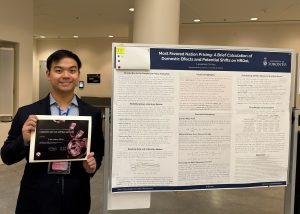
Lawrence Hsu is a champion of interdisciplinary research. That’s why the second year PhD student of economics chose to present his work at a biotechnology conference. It’s also how he won the best poster award while he was there. Across disciplines, research posters are important tools in the dissemination of study results at academic conferences. They provide a complete and accessible visual overview of the project to attract attention and inspire discussion among attendees. Hsu’s work in health economics focuses on the pharmaceutical industry, which was a good fit for the Boston Taiwanese Biotechnology Association’s (BTBA) annual symposium held at Harvard earlier this July.
“Fundamentally, I aim to observe industrial responses to achieve a more accurate structure that describes the correlation between revenue loss and R&D in drug development,” Hsu explained.
For his study, Most Favored Nation Pricing: A Brief Calculation of Domestic Effects and Potential Shifts on Health-related Quality-of-life, Hsu tested how successful a national pharmaceutical policy that sees companies absorb R&D development expenses over time would be. To do this, he applied nursing and health service research to evaluate the mental stability of the patient population when price cuts on drugs are realized as a major benefit of the policy. He found that the mental health of the majority of the patient population improved when the cost of treatment went down.
“I discovered that some scholars cited past research to claim that the policy would or would not work, while others made their claims based on prevailing political beliefs,” Hsu said. “As a Canadian, I could set my own beliefs aside and model policies such as these in a rather more neutral framework.”
The models Hsu proposes to examine the role of R&D costs in drug pricing are timely.
“The U.S. banned traditional cost-effectiveness analysis tools with quality-adjusted life-years (QALY) last year,” he said. “Disability and severity adjustment of economic evaluation became the new tool to fit federal standards. My research highlights the importance of these adjustments that could even reverse the expected benefits of a new policy.”
Return to the Department of Economics website.
Scroll more news.
